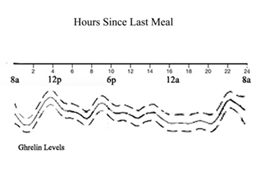
Is there anything as scary as being overweight? We usually don’t think of it that way, but we should. Being overweight can lead to several serious health issues, including stroke, heart attack, and vascular disease, to name a few. Take the scary out of diet – learn how to combine fasting and diet to lose excess weight at: lovethisdiet.com
We have covered the role of insulin in the storage of fat. So, what about hunger? Is it all in our heads, or are there other factors influencing how hungry we get? No doubt eating at certain times of the day can become a habit. For example, it can determine when our hunger hormone (ghrelin) peaks in our bloodstreams.
When your ghrelin levels are high, you are hungry. When your ghrelin levels are low, you are not. For this reason, ghrelin is called the hunger hormone.

Note that ghrelin levels peak we feel hungry, our stomachs may also be growling. For example, ghrelin peaks in the morning, then around noon, and again at dinner time. The peaks in ghrelin levels coincide with the times we generally eat our three meals each day.
Another hormone, leptin, tells us when we are full or satisfied. At least it did when we were kids. Then, society taught us to ignore leptin’s messages and to eat and eat. Think about babies; when a one-year-old is full, there is no way on earth you are going to get that child to eat another bite! Their leptin is telling them they have had enough, and that’s it. As we grew, we unlearned how to recognize the signals from leptin, and it is tough to relearn to recognize these messages as adults. It can be done, but you really have to work at it.
Remember the Clean Plate Club? “Clean up your plate, kid, or no dessert!!!” When our children were young, my wife and I decided that there would be no clean plate club in our home. We allowed our children to eat as they pleased, and when they were full, they could ask to leave the table. My wife, being the responsible parent, was concerned about nutrition. She always made sure there were healthy snacks around the kitchen and carefully recorded what they ate over time. The results showed that they would eat one type of food for a few days, such as carbs, and switch to proteins for the next few days. Weeks and weeks of monitoring confirmed that they were eating a balanced diet. Their bodies instinctively knew what was needed to stay healthy, and they ate accordingly.
So, we need to relearn how to listen to our bodies’ “stop eating” signals. It takes a lot of work, but it can be done. I have been living the IF lifestyle + diet for one year as of November 15, and I am still learning to listen to my leptin signals.



